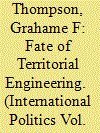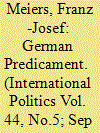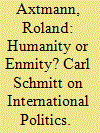|
|
|
Sort Order |
|
|
|
Items / Page
|
|
|
|
|
|
|
| Srl | Item |
| 1 |
ID:
078484


|
|
|
|
|
| Publication |
2007.
|
| Summary/Abstract |
This article explores what English School theorists claim for history in the study of international relations. The writings of Hedley Bull and Herbert Butterfield are examined with a view to providing an idealized though coherent distillation of the place historical enquiry enjoys in English School theory. The limitations of their respective positions, which cannot fully sustain the English School claim that historical knowledge is important in understanding international relations, are addressed by turning to Michael Oakeshott's conception of history as fable. The article concludes by reaffirming the place English School theorists give to historically informed theory by, paradoxically, denying to history any didactic character and therefore any practical relevance. For it will become evident that a didactic history - and whatever lessons it offers - is an illusion made in the present for the present, which is neither historical nor instructive
|
|
|
|
|
|
|
|
|
|
|
|
|
|
|
|
| 2 |
ID:
078483


|
|
|
|
|
| Publication |
2007.
|
| Summary/Abstract |
Does there exist a genuine threat to the continuation of a broadly liberal international (and domestic) order, driven by the re-emergence of religious and secular fundamentalisms? This article assesses this issue in the context of first the rise of territorial power and then its fate in a period of globalization and the revival of religious intolerance. The twin concepts of sovereign-power and bio-power are deployed to investigate the emergence of territorial engineering in the 17th century. A key feature of modern fundamentalisms is that they promote and trade on the deterritorialization of social, political, cultural and economic activity. It is argued that this is a manifestation of a new form of 'spirited martial power'. The risks associated with these developments should not be over-exaggerated but they exist nonetheless. If this is the case, the problem becomes one of how to re-territorialize the activities and disputes engendered by this reappearance and re-emergence of spirited martial power in the international system, with all its attendant links to religious fundamentalisms. Here the argument is that this requires a re-examination of the nature of international borders, and indeed a re-emphasis on their role, not just in respect to containing disorder and restoring the capacity for governance, but also as a way of re-configuring international toleration and of righting a wrong
|
|
|
|
|
|
|
|
|
|
|
|
|
|
|
|
| 3 |
ID:
078487


|
|
|
|
|
| Publication |
2007.
|
| Summary/Abstract |
What will be the legacy that President George W. Bush bequeaths to his successor in the fields of global trade and finance? In answering this question, the article will analyse the three most crucial international economic issues that the Bush administration has faced during its two terms in office. First, Bush's policy of trade liberalization will be considered. While the United States has negotiated a significant number of new bilateral and regional trade agreements over the past 7 years, global trade talks remain deadlocked. With increasing protectionist sentiment in evidence in Congress, Bush is unlikely to conclude the Doha Development Round by the time he leaves office in 2009. Second, global trade imbalances partly caused by the US current account deficit threaten the stability of international financial markets and global prosperity. The article concludes that the US has pursued a policy of 'begin neglect' towards the problem and needs to act more proactively to prevent a hard landing for the American and world economies. Finally, the economic relationship between the US and China is examined. The article argues that the United States needs to continue to engage China in the interests of global economic growth and regional stability in Southeast Asia while avoiding a trade conflict
|
|
|
|
|
|
|
|
|
|
|
|
|
|
|
|
| 4 |
ID:
078489


|
|
|
|
|
| Publication |
2007.
|
| Summary/Abstract |
The election of Angela Merkel as the first female Chancellor of Germany does not herald a fundamental transformation of Germany's security and defence policy but marks a high degree of continuity with the policies of the red-green government. The double challenge facing the Merkel government is its readiness to back up the country's institutional and material commitments to both NATO and EU by concrete deeds and to reconcile the ever bigger external demands with the country's culture of reticence. To bring these competing external and internal demands into a lasting equilibrium is the true challenge to the systematic scientist's approach of Chancellor Merkel. To the disappointment of some allies and partners, this highly demanding task may prove again like trying to square the circle.
|
|
|
|
|
|
|
|
|
|
|
|
|
|
|
|
| 5 |
ID:
078485


|
|
|
|
|
| Publication |
2007.
|
| Summary/Abstract |
This article reviews Schmitt's analysis of international politics from the period of the Weimar Republic to the early years of the German Federal Republic. It highlights the importance of Schmitt's opposition to Woodrow Wilson's policies and 'liberal' universalism more generally for his understanding of and engagement with international politics. Confronted with the decline of the state (the Ende der Staatlichkeit), Schmitt develops a concept of the political that is not tied in with the existence of the state. Schmitt embraces the fascist stato totalitario as a model for a 'qualitatively' strong state and the distribution of the earth into hegemonic Grossräume as the new nomos
|
|
|
|
|
|
|
|
|
|
|
|
|
|
|
|
| 6 |
ID:
078486


|
|
|
|
|
| Publication |
2007.
|
| Summary/Abstract |
The purpose of this article is to afford a full explanation as to why the 'Somalia incident' had such a massive impact on US politics and subsequent foreign policy decisions. Why did the raid elicit such a storm of criticism when similar operations such as Beirut (1983), Grenada (1983), Panama (1989), and the Gulf War (1991) did not? Was it because of a negative US public? Was it shock on the part of the Executive or Legislative Branches? Was it because of extreme pressure from one of America's most conservative power bases, the military? Or could it be, that sensing a potential threat to domestic concerns, a Clinton Administration, whose commitment to multilateralism was more diaphanous than dynamic, simply abandoned its policy to the spears, of its critics
|
|
|
|
|
|
|
|
|
|
|
|
|
|
|
|
| 7 |
ID:
078488


|
|
|
|
|
| Publication |
2007.
|
| Summary/Abstract |
The World Trade Organization Millennium Round meetings held in Seattle, Washington in late 1999 provide a unique way to examine changes in the post-Cold War system. This case uses the intergovernmental organization to consider the ongoing debate over the effect of nongovernmental organizations (NGOs) on state sovereignty. The expected outcome of NGO activity is erosion of state sovereignty, as private citizens across political boundaries unite for a common cause. Paradoxically, however, the outcome in this case is one where NGO activity actually serves to reinforce state sovereignty, fortifying the control, legitimacy, and autonomy of states in both the global north and south in a variety of ways.
|
|
|
|
|
|
|
|
|
|
|
|
|
|
|
|
|
|
|
|
|